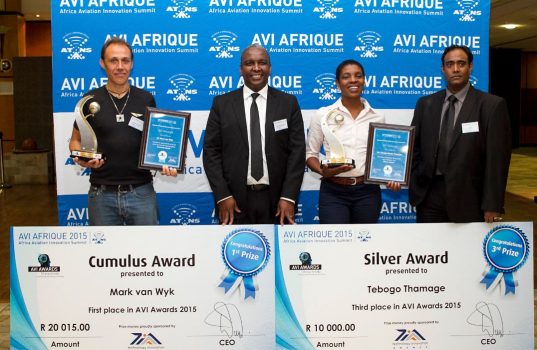2015 ATNS Avi Afrique Aviation Innovation Summit
WELCOME ADDRESS BY ATNS CEO MR THABANI MTHIYANE: 2015 ATNS AVI AFRIQUE AVIATION INNOVATION SUMMIT
Distinguished guests, ladies and gentlemen
I had the great pleasure of opening the Avi Afrique Expo yesterday, and today it is equally my great pleasure to welcome you to the conference portion of the 2015 ATNS Avi Afrique Aviation Innovation Summit. I trust that you will all benefit from what we will hear today—our ATNS team has, as usual, managed to assemble some noteworthy thought leaders in aviation and associated disciplines to stretch our minds, which is the prerequisite for any innovation.
The theme of this year’s conference is “Innovation: The key to aviation sustainability in Africa”. I take this to mean that we will be focusing our discussion of innovation around the challenges and opportunities facing aviation on this continent. That African focus is evident in the titles of many of the presentations and discussions we will be hearing today.
I am particularly pleased to welcome speakers and participants from the academic community – to the Avi Afrique Innovation Summit. Aviation is a highly technical field, whether one is talking about the engines that power the aircraft, the materials and techniques to build them, the comfort and safety of passengers inside the cabin and, of course, the management of an airspace. All of these disciplines rely on bright young minds with the right skills to take them forward. We rely on the academic institutions for these graduates, and also to provide much of the research that fuels innovation.
In light of the current developments in South Africa around exclusion from tertiary education, we need to come together as an industry to see how best we can help our colleagues in academia overcome these challenges – to ensure universities are adequately funded. I am sure this is one of the issues that will be discussed in the course of the Summit.
Within the whole complex question of university funding and financial exclusion, the private sector has, of course, a big role to play. Already, private sector companies provide bursaries and other financial help to assist promising students to graduate, and I am sure that they will expand their role as they are able. We hear so much about the skills shortages that are holding back the economy—let’s work together to make sure we produce the skills. We have raw talent, let’s not waste it.
Innovation as the catalyst for African aviation
Much is being said and written about the African Renaissance. Having been seen as a basket case, the continent is now being positioned as a growth frontier and an attractive destination for investment. Of course, there are dangers in this new way of seeing Africa, because it could still relegate the continent to the status of being a rich resource to be exploited, with the profits travelling offshore. One of the ways we can prevent this from happening is by building strong regional economies able to compete with Eastern and Western investors. The aviation industry has a key role to play in helping to promote the creation of these regional networks of trade and understanding.
Those of us involved in aviation in Africa should thus see ourselves as involved in something that is much larger than the profits of our individual companies—we are helping to enable the emergence of Africa as an economic powerhouse. In that context, the imperative to innovate becomes even more pressing. The better our aviation network is, the more use it is to the African economies it serves, and the more they will use us: a true virtuous cycle, in other words! While we definitely can benefit from the innovations generated by the aviation industry globally, we also need to work together to create African solutions to Africa’s problems. Some of these challenges include getting the right kind of infrastructure and technology in place, and developing a sustainable bio-fuels industry to supply the industry—all of which has the potential to create much-needed jobs and build African wealth, if we do it right.
Launch of the Avi Awards
One of the highlights of this year’s Avi Afrique event was the presentation of the inaugural Avi Awards, sponsored by Technology Innovation Agency (TIA). In launching this awards programme, ATNS is aiming to provide a focus for the tremendous innovative potential we have always seen in within the African aviation industry. We believe and hope that these awards will inspire talented people to make a contribution to aviation. We also feel that one cannot underestimate the power of positive affirmation that an awards programme can offer to people who often work in isolation—to receive concrete proof that your work is highly regarded is important to creative people.
We see this every year in many of the creative disciplines—at the Oscars and Emmies, at the Manchester Booker and, of course, at the Nobel Prize awards ceremonies. I just wish we could offer that sort of prize money… Seriously, though, in time to come I hope we will see Avi Award-winners transforming African and even global aviation.
I must here acknowledge that the Avi Awards are the result of a partnership between ATNS and TIA, which itself links two critical role-players in aviation, the Departments of Transport and of Science and Technology. Government has a vested interest in promoting innovation in the economy, and these two Departments are already substantial investors in aviation innovation, in addition to providing an enabling environment through R&D policies and strategies.
Innovation as a catalyst for economic development
I’d like to end by talking a little about the bigger picture, which is the role that innovation plays in driving economic growth generally, and thus in developing this nation and the continent of Africa as a whole. For example, the South African National Development Plan relies on innovation to stimulate growth and form new industries. All developing economies must absorb this important lesson, because without innovation they are condemned to remain consumers of other countries’ products and services.
The truth is that wealthy nations build their prosperity not just on their natural resources, but on the skills of their people—thus on innovation rather than extraction. Such knowledge economies command high margins and outlast mineral deposits and drought years. Aviation, with its high reliance on a number of highly technical industries, is well positioned to stimulate growth across many sectors of the economy, thus promoting the development of such a knowledge economy. Civil aviation, in particular, offers still a largely unrealised opportunity to create supporting industries across its entire value and supply chains.
Thanks to all our speakers and panellists for their hard work and the insights they will share with us, in particular our keynote speakers, Professor Bennie Anderson from the Da Vinci Institute and Dr Malindi Neluheni from Transpace.
Finally, a word of thanks to all of you for your attendance today. A Summit is the sum of all the people attending it (if you’ll forgive the pun)—enjoy the day and I hope it provides you with lasting inspiration.
Related Posts
« Mazda Reveals Mazda RX-VISION Concept Thirteen injured in Utrecht taxi rollover »
























